We use cookies on this website. Cookies help us deliver the best experience on our website. Read about cookies.
-
- Education
- Education
- Programmes and courses
- Applications and admissions
- Tuition fees
- Scholarships
- Exchange studies at Malmö University
- Study Guidance
-
- After admission
- After admission
- Moving to Malmö
- Pre-orientation
- Arrival guide
-
- About studies at Malmö University
- About studies at Malmö University
- Why choose Malmö University
- Understanding university studies
- Connect with our students
On the page -
- Research
- Research
-
- Doctoral studies
- Doctoral studies
- Doctoral courses
-
- Doctoral schools
- Doctoral schools
- Education, Learning and Globalisation
- Doctoral school: Learning in Multicultural Societal Contexts
- ComBine
- Swedish National Graduate School in Science and Technology Education Research
- Doctoral school: Relevancing Mathematics and Science Education (RelMaS)
- Doctoral school: Sustainable Movement Education
- Finding ways in a time of great future challenges (FinnFram)
- Doctoral school: Pedagogy and Vocational Skills
- Doctoral school: Culturally Empowering Education through Language and Literature
- Research subjects
-
- Research centres
- Research centres
- Biofilms Research Centre for Biointerfaces
- Citizen Health
- Imagining and Co-Creating Futures
- Institute for Urban Research
- Malmö Institute for Migration Studies
- Literacy and Inclusive Teaching
- Centre for Work Life Studies
- Sustainable Digitalisation Research Centre
- Centre for Sexology and Sexuality Studies
-
- Research publications
- Research publications
- Search publications
- Malmö University Press
- Research events
- Participate in a research study
- Coffee Break Quiz
On the page -
- Collaboration and Innovation
- Collaboration and Innovation
-
- Areas of collaboration
- Areas of collaboration
- Muvah
- Innovation
- Collaboration with students
-
- Collaborate with researchers
- Collaborate with researchers
- Labs and facilities
- Culture collaboration
- Support Malmö University
- Alumni & Friends
On the page -
- About us
- About us
-
- Faculties and departments
- Faculties and departments
-
- Faculty of Culture and Society
- Faculty of Culture and Society
- Department of Urban Studies
- Department of Global Political Studies
- School of Arts and Communication
-
- Faculty of Education and Society
- Faculty of Education and Society
- Department of Childhood, Education and Society
- Department of Sports Sciences
- Department of Natural Science, Mathematics and Society
- Department of School Development and Leadership
- Department of Culture, Languages and Media
- Department of Society, Culture and Identity
-
- Faculty of Technology and Society
- Faculty of Technology and Society
- Department of Computer Science and Media Technology
- Department of Materials Science and Applied Mathematics
- Faculty of Odontology
- University Dental Clinic
-
- Find and contact Malmö University
- Find and contact Malmö University
- Visit Malmö University
- News and press
- Map of the buildings (Google Maps)
- Merchandise
- Whistleblowing
- Management and decision-making paths
-
- Vision, objectives and strategy 2025
- Vision, objectives and strategy 2025
- Global engagement
- Sustainability
- Widened recruitment and participation
- Quality assurance work at the University
-
- Malmö Academic Choir and Orchestra
- Malmö Academic Choir and Orchestra
- Student work – video pieces
-
- Annual Academic Celebration
- Annual Academic Celebration
- Academic traditions
- Meet our new professors
- The University in a troubled world
On the page
Environmental report 2023
2023
Environmental report for 2023, including foreword by the Vice-Chancellor, extracts from the report itself, and examples of the work we do.
Download the Environmental Report 2023
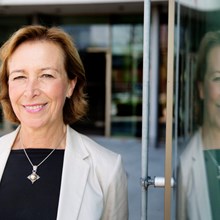
Foreword from the Vice-Chancellor
In this environmental report for the year 2023, we can note that we are on track with our high ambitions, but also that more work remains to be done before we reach our overall objectives.
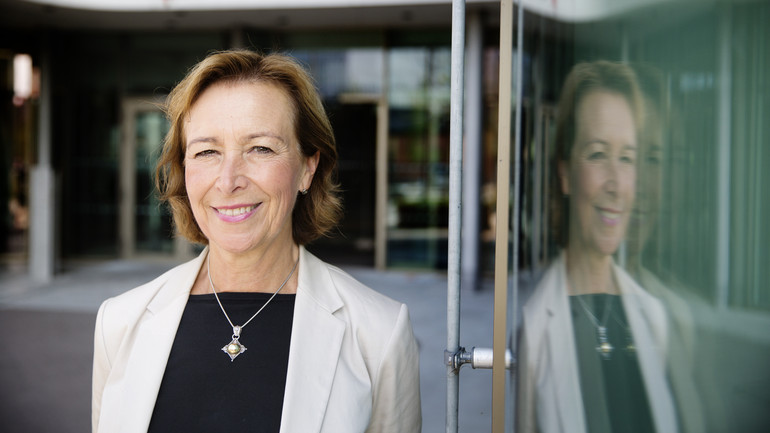
Foreword from the Vice-Chancellor
In this environmental report for the year 2023, we can note that we are on track with our high ambitions, but also that more work remains to be done before we reach our overall objectives.
Based on Strategy 2025, Malmö University's environmental work can be said to be conducted on a broad front in two main tracks. The University will contribute to meeting global climate challenges by producing and disseminating multidisciplinary knowledge, in collaboration with other societal actors. We also contribute by reducing the climate and environmental impact of our own operations.
The University's new 'Collegium for research on climate and societal transition at the University' is an exciting initiative to contribute with even more knowledge in the field of environment and sustainability in the future. The collegium was established last autumn on the initiative of an internal climate research network. The newly formed collegium already spans all faculty boundaries and will hopefully lead to even more interdisciplinary collaborations within the University.
Last year, we adopted a new guideline for sustainability considerations at meetings and events. This means, for example, that we will try to avoid food waste, use vegetarian food as a standard and choose digital channels for communication instead of printed material.
In 2023, we also focused more on environmental requirements in connection with procurement. The initiative has yielded positive results and will continue in 2024, in order to strengthen the skills of employees who carry out direct procurement and other purchases.
A number of initiatives have been implemented to improve the efficiency of both our premises and energy consumption. As a result, the University has been able to cancel some leases – and, thus, also reduce costs related to premises.
Following the termination of the Advisory Board for a Sustainable University, a review has also been carried out regarding how the joint environmental work should be coordinated and systematised. A further step in this work is the formation of an environmental group within the Joint University Administration and Services during this year, with the aim of increasing coordination and finding synergies between departments.
In conclusion, we can state that environmental work covers all parts of our activities and concerns us all. We must all think, act and take responsibility, perhaps by reminding ourselves of old, tired sayings such as "little streams make big rivers", or "no one can do everything, but everyone can do something". This applies to, for example, our business travel. The 2023 results show that we will not reach next year's emissions target at the current rate of reduction.
We are doing a lot of good, but together, we can try to do even better.
Environmental perspective in Strategy 2025
According to Malmö University's strategy 2023-2025, we will:
- contribute to meeting global challenges within climate, health and democracy through multidisciplinary research-based knowledge.
- Reduce its own climate and environmental impact, continuously monitor the progress and regularly communicate the results both internally and externally.
Numbers
-
182 000
kWh electricity production from solar panels
-
-19
per cent carbon dioxide from business travel
-
40 722
recycled bottles and cans
Business travel
In short
The total number of kilometres flown has decreased by 27 per cent. However, in many cases, the guidelines for shorter flights have not been followed.
We have changed our travel patterns and are reducing our emissions, even as we grow as a university with more and more international collaborations. Carbon dioxide emissions from business travel have been reduced by 19 per cent in 2023 compared to the base year 2019. Emissions from flights have decreased by 19 per cent and the number of kilometres flown has decreased by 27 per cent. The result for 2023 is, however, not in line with the reduction rate expected to achieve the environmental target.
Journeys to/from Stockholm from/to Malmö region airports:
- 2019: 1236
- 2022: 220
- 2023: 525
Although the current guidelines only authorise air travel to/from Stockholm in exceptional cases, there as been a relatively large amount of air travel to/from Stockholm in 2023.
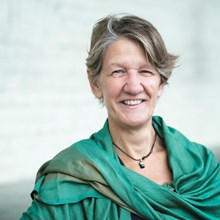
Urban studies reduce their environmental impact
In connection with operational planning, the university's departments and units are expected to concretise the central strategy and environmental goals, and formulate their own activities.
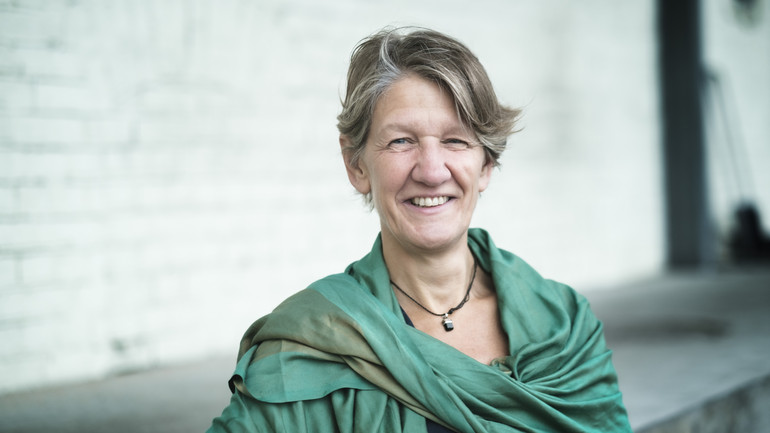
Urban studies reduce their environmental impact
In connection with operational planning, the university's departments and units are expected to concretise the central strategy and environmental goals, and formulate their own activities.
One department that has set a good example is the Department of Urban Studies at the Faculty of Culture and Society.
"We have taken several measures to reduce our environmental impact. For example, we have given doctoral students the opportunity to receive extra grants for travelling by train, and we have decided to have plant-based food as a standard in our food orders," says Head of Department Kerstin Sandell.
"When I heard that the possibility of ordering reused computers is available from the University's IT supplier, I thought it was obvious that this should be our first choice," says Hanna Runnqvist, administrative assistant at the faculty.
The Department of Urban Studies has also calculated its emissions from business travel. At the beginning of next year, a workshop on how to reduce emissions further is planned with the department's research council.
Properties
In short
Systematic work on energy efficiency has been very successful.
Malmö University operates in nine properties in Malmö, with a total leased area of 115 349 square metres. How much control the University has over the properties depends on the agreements the University has with the property owner and on other factors, such as whether or not the University is the only tenant. The property-related environmental work is therefore a combination of our own investments and dialogues with landlords, where requests for environmental improvements are made.
Work on the objectives includes both energy efficiency measures and installations for self-generation of energy. Total energy consumption is eight percent lower per rented square metre in 2023 compared with the base year 2019. Electricity consumption has decreased by 14 per cent during the period.
Solar panels at Orkanen
In 2023, more solar panels were installed on the roof of the Orkanen building. The installation is one of the largest in Malmö. In 2023, the first units have been in operation all year and the new ones part of the year. The total production was 182,000 kWh, which corresponds to about nine per cent of the property's electricity consumption.
Chemicals and other substances hazardous to health and the environment
In short
The phasing out and replacement of chemicals has reduced the number of hazardous substances in the University's premises.
The total number of registered substances has decreased by 11 per cent since 2019, due to archiving and phasing out of products that are no longer in use. Substances of very high risk have been phased out by 23 per cent since 2020.
The use of substances of very high risk is always preceded by an assessment to ensure that it is necessary, as safe as possible and that no better alternatives exist.
Waste
In short
Investments in improved sorting facilities has resulted in a decreased amount of residual waste. However, in order for the University to reach the goal of halving residual waste (compared to 2019), efforts are required from the entire organisation.
In the properties where we have control over waste management, residual waste has decreased by 35 per cent between the years 2019 and 2023, but an increase can be seen since 2022. The increase has mainly occurred at Niagara, where waste management did not function as desired in the first half of 2023. Measures were taken during the summer, and a reduction is expected in 2024. An increase in the number of students also contributed to an increase in the amount of residual waste. Circular use of paper towels amounts to 6.8 tonnes of waste, which was previously residual waste. This corresponds to a carbon dioxide emission reduction of 2.7 tonnes.
IT and digitalisation
In short
100 per cent take-back of computers for re-use and recycling have been achieved. The focus is now on reclaiming mobile phones and tablets.
Reclaiming IT equipment is an important part of our environmental work. The internal statistics are now pointing upwards – more and more computers are being returned. 100 per cent of computers are now returned in computer exchanges. These devices can be used elsewhere or recycled.
In addition to the above goals, the University has also worked to reduce emissions from deliveries of IT equipment. Collective weekly deliveries, reloading to smaller vehicles in Malmö and unpacking before transport are examples of such measures. From the start of the year, IT deliveries will be fossil-free.
Contact
If you have any questions or concerns, please contact the environmental coordinator.
miljo@mau.seReuse
Reuse of furniture – Student Union
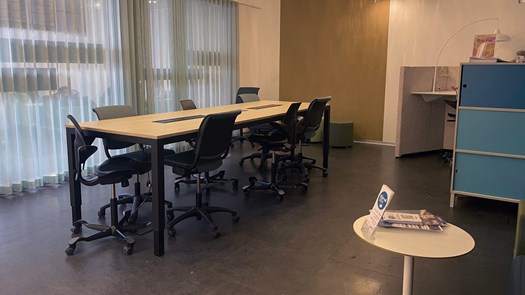
Reuse of furniture – Student Union
In 2023, new premises were furnished for the Malmö Student Union at the University Library. All furniture are directly reused, or reused by renovating furniture from other premises within the University.
Renovating furniture as an alternative to buying new ones
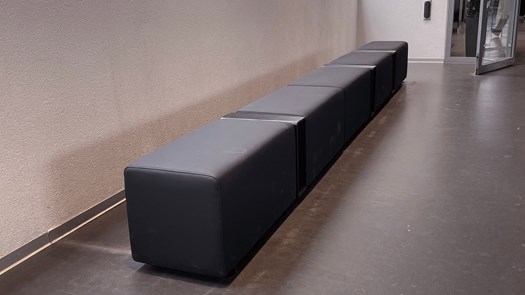
Renovating furniture as an alternative to buying new ones
An example of reuse is the careful renovation of furniture. This includes preserving as much of the original as possible. The picture shows an example of how so-called 'poufs' were renovated and then returned to the premises outside the entrance of the Orkanen Library.
Energy efficiency and reuse of furniture when changing premises
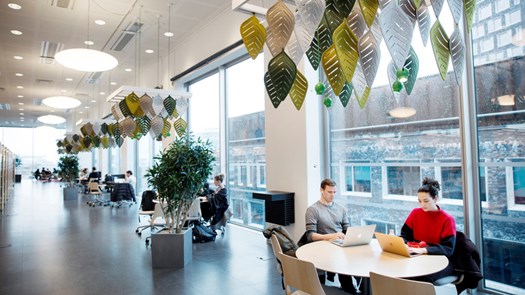
Energy efficiency and reuse of furniture when changing premises
During the summer, the premises of three institutions in the Orkanen property were renovated. Lighting was replaced with LED luminaires for both better light and energy efficiency. Existing furniture has been reused.